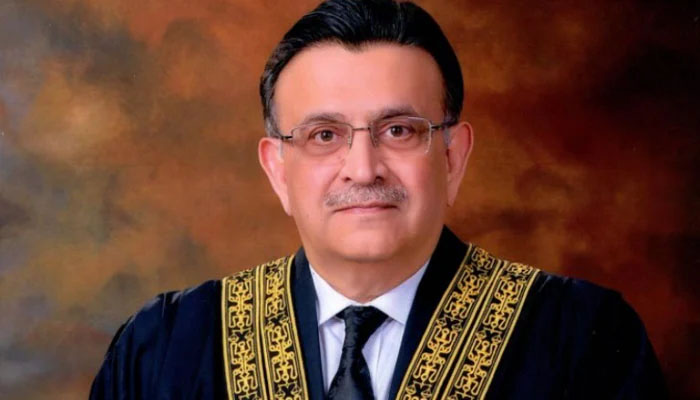NAB filed LNG cases without reviewing contract: CJP
A three-member bench of the apex court heard petition of PTI challenging amendments made by the coalition government to NAO 1999
ISLAMABAD: Chief Justice of Pakistan Justice Umer Ata Bandial said Wednesday assets beyond the source of income are considered an offence across the globe, adding the court would examine the recent amendments made to the NAB law at the touchstone of international as well as local laws.
A three-member bench of the apex court headed by the CJP and comprising Justice Ijazul Ahsen and Justice Syed Mansoor Ali Shah heard the petition of Pakistan Tehreek-e-Insaaf (PTI) challenging the amendments made by the coalition government to the National Accountability Ordinance (NAO) 1999.
Continuing his arguments, PTO counsel Khwaja Haris stated that the recent amendments by the coalition government in National Accountability Ordinance (NAO) are also against the International Convention on Anti-corruption. The CJP asked the counsel to place before the bench the basic points to save court’s time.
Khwaja Haris submitted that under the amendments, the decisions of cabinet and working development have also been excluded from the jurisdiction of NAB. At this Justice Bandial remarked that important decisions in the country are taken jointly by the federal cabinet and committees and if all its members were to be deemed accused, “who would take the decisions then?” “If the parliament starts doing everything, the decision-making process will slow down,” he said. Look into the case of Liquefied Natural Gas (LNG) where the case was made without examining the facts and several bureaucrats were nominated in the reference”, the CJP remarked, adding that though these bureaucrats were acquitted in the reference, they had to face imprisonment. The CJP further observed that agreement like LNG is made at the government level, adding that sometimes, circumstances are not in the control of bureaucrats.
During the hearing, Justice Mansoor Ali Shah asked the counsel as to whether the accused benefited from the present amendments could fall into the clutches of any other law.” The judge further asked the PTI counsel as to if the present NAB law would also have been challenged if it had come in 1999? Khwaja Haris replied that it could be challenged if some flaws and loopholes surfaced. He submitted that the government has made recent amendments with mala fide intention to give benefit to specific personalities. It was the first target of the present coalition government to quash all cases of corruption, filed against it, he contended.
The counsel questioned whether billions of rupees spent by the anti-graft body on the investigation of corruption cases could be wasted and whether the judges of accountability courts are not being trusted to adjudicate such cases and cannot provide justice. He further contended that there was no law available for misuse of authority, adding that under the new amendments, it was made impossible to establish cases of corruption under Rs500 million. He submitted that one can only be proceeded against if the case of benefiting someone is established, adding that under the amendments the direct involvement of public office holders to misuse his powers will have to be established.
Justice Ijazul Ahsen observed that colourable legislation has been made, and instead of strengthening the accountability laws, the amendments cleared the way for taking benefits that do not come in the domain of NAB law. “It opens the way for systematic corruption”, Justice Ahsen remarked. Meanwhile, the court adjourned the hearing until next week.
-
 Reese Witherspoon Sparks Nostalgia With 'Green Sisters' Tribute To Jennifer Aniston
Reese Witherspoon Sparks Nostalgia With 'Green Sisters' Tribute To Jennifer Aniston -
 Royal Family Faces Fresh Crisis While Andrew's Controversy Refuses To Die
Royal Family Faces Fresh Crisis While Andrew's Controversy Refuses To Die -
 Travis Kelce’s Mom Talks About Taylor Swift’s Wedding Dance Song And Whether She’s Signed An NDA
Travis Kelce’s Mom Talks About Taylor Swift’s Wedding Dance Song And Whether She’s Signed An NDA -
 James Van Der Beek's Final Days 'hard To Watch' For Loved Ones
James Van Der Beek's Final Days 'hard To Watch' For Loved Ones -
 Lewis Hamilton Ditched Question About Kim Kardashian?
Lewis Hamilton Ditched Question About Kim Kardashian? -
 Will Smith, Jada Pinkett's Marriage Crumbling Under Harassment Lawsuit: Deets
Will Smith, Jada Pinkett's Marriage Crumbling Under Harassment Lawsuit: Deets -
 'Fake' Sexual Assault Report Lands Kentucky Teen In Court
'Fake' Sexual Assault Report Lands Kentucky Teen In Court -
 'Vikings' Star Shares James Van Der Beek's Birthday Video After His Death
'Vikings' Star Shares James Van Der Beek's Birthday Video After His Death -
 Jennifer Aniston Receives Public Love Note From Jim Curtis On 57th Birthday
Jennifer Aniston Receives Public Love Note From Jim Curtis On 57th Birthday -
 Microsoft AI Chief Says AI Will Replace Most White-collar Jobs Within 18 Months
Microsoft AI Chief Says AI Will Replace Most White-collar Jobs Within 18 Months -
 Late Virginia Giuffre’s Brother Reacts To King Charles’ Promise Against Andrew Mountbatten-Windsor
Late Virginia Giuffre’s Brother Reacts To King Charles’ Promise Against Andrew Mountbatten-Windsor -
 Ex-Arsenal Footballer Thomas Partey Charged With Additional Rape Counts
Ex-Arsenal Footballer Thomas Partey Charged With Additional Rape Counts -
 AI Regulation Battle Heats Up: Anthropic Pledges $20m To Rival OpenAI
AI Regulation Battle Heats Up: Anthropic Pledges $20m To Rival OpenAI -
 Queen Camilla Makes Poignant Visit To Police Stations To Inspect Work
Queen Camilla Makes Poignant Visit To Police Stations To Inspect Work -
 Chloe Kim Set For Historic Halfpipe Gold Showdown At Milano Cortina
Chloe Kim Set For Historic Halfpipe Gold Showdown At Milano Cortina -
 Brooklyn Beckham Gives Cold Response To Cruz's Olive Branch Amid Feud
Brooklyn Beckham Gives Cold Response To Cruz's Olive Branch Amid Feud




